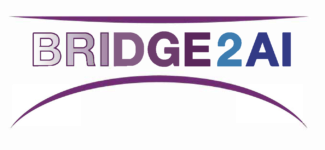Bridge2AI and CHoRUS Recognized at 2025 OHDSI Global Symposium for Advancing Open Standards in Clinical Care AI
November 4, 2025
The Observational Health Data Sciences and Informatics (OHDSI) community honored Bridge2AI and CHoRUS at its 2025 Global Symposium, recognizing their leadership in developing open data standards that enable ethical and scalable AI for clinical care.
Two members of the Bridge2AI community, Polina Talapova, MD, PhD, and Jared Houghtaling received OHDSI’s prestigious Titan Award, one of the organization’s highest honors.
Talapova was recognized for outstanding contributions to Data Standards, including advancing the OMOP Common Data Model and standardized vocabularies that harmonize health data across institutions worldwide.
Houghtaling, together with collaborators, was honored for excellence in Open Source Development, recognizing his work in designing and deploying software tools that enable large-scale, collaborative analyses.
The Bridge2AI CHoRUS team also received the Best Community Contribution Award for their project, “OMOP Waveform Extension: A Schema for Integrating Physiological Signals and Derived Features into the OMOP Common Data Model.” This innovation extends the OMOP framework to include waveform data—such as ECG, EEG, and blood pressure signals—securely integrating them with de-identified electronic health record data. The result is a foundation for multimodal AI research within trusted, privacy-preserving environments.
This work embodies the Bridge2AI CHoRUS vision: connecting clinical, imaging, waveform, and exposomal data through open frameworks and ethical AI practices. These efforts, inspired by the late Andrew Williams, PhD, continue his legacy of advancing interoperability and open science in healthcare data.
Together, Bridge2AI and CHoRUS demonstrate the real-world impact of NIH-supported innovation—establishing shared standards, open-source tools, and scalable multimodal datasets that help researchers understand patients in richer context and accelerate discoveries to improve care.
